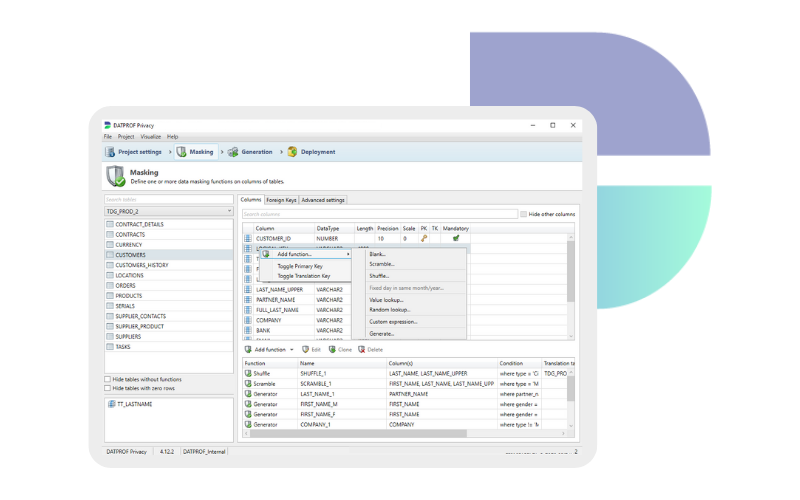Data-Driven Testing: Unlocking the Power of Test Data
In the realm of software testing, data-driven testing has emerged as a powerful approach that allows testers to optimize the efficiency and effectiveness of their testing efforts. By leveraging production-like data in the testing process, data-driven testing enables testers to identify defects, validate functionality, and ensure the overall quality of software applications. In this article, we will explore the concept of data-driven testing, its benefits, and the critical need for test data in the testing process.
What is Data-Driven Testing?
Data-driven testing is a testing approach where test cases are designed and executed using different sets of test data. Instead of relying on a fixed set of input values, data-driven testing involves creating a separate set of test data that is independent of the test logic. This data is used to drive the testing process, allowing testers to evaluate how the software application responds to various data inputs. The test data can be generated manually or automatically, and it can be in the form of different data types such as strings, numbers, dates, and more.
Benefits of Data-Driven Testing
Data-driven testing offers several significant benefits that make it an invaluable approach in software testing.
Improved Test Coverage
One of the primary benefits of data-driven testing is the ability to achieve comprehensive test coverage. By using a wide range of test data, testers can evaluate different scenarios and edge cases that may not be apparent with a limited set of inputs. This helps in identifying defects and vulnerabilities that may arise in different situations, ensuring that the software application is thoroughly tested and validated.
Reusability and Scalability
With data-driven testing, the test data is separate from the test logic, making it highly reusable and scalable. Testers can easily modify or update the test data without changing the test cases, allowing for quick and efficient updates when requirements or inputs change. This makes data-driven testing ideal for agile development environments where software applications are subject to frequent updates and changes.
Faster Test Execution
Data-driven testing enables testers to execute a large number of test cases with minimal effort. By automating the process of generating and feeding test data into the test cases, testers can execute tests quickly and efficiently, saving time and resources. Perfect for test automation. This allows for faster test cycles, quicker identification of defects, and faster resolution of issues, leading to faster time-to-market for software applications.
Increased Test Accuracy
Data-driven testing helps in achieving higher test accuracy by reducing human error in the testing process. With automated generation and execution of test data, the chances of input errors or mistakes are minimized, resulting in accurate and reliable test results. This helps in improving the overall quality of the software application and reducing the risk of defects slipping into production.
The Critical Need for Test Data
Test data is a critical component of data-driven testing, and it plays a pivotal role in ensuring the success of the testing process. Here are some reasons why test data is essential in software testing:
Real-World Scenario Simulation
Test data allows testers to simulate real-world scenarios and evaluate how the software application performs in different situations. It helps in identifying defects that may occur with specific data inputs, and it ensures that the application is robust and resilient to different data sets.
Edge Case Validation
Test data enables testers to validate edge cases and boundary conditions that may not be apparent with a limited set of inputs. It helps in identifying defects that may arise in extreme scenarios, and it ensures that the application is tested for all possible scenarios, reducing the risk of issues arising in production.
Requirement Validation
Test data is crucial in validating whether the software application meets the requirements specified in the project documentation. It helps in ensuring that the application behaves as expected with different input values, and it validates the correctness of the application’s behavior against the defined requirements and specifications.
Error Detection
Test data is essential in detecting errors, defects, and vulnerabilities in the software application. By using various test data inputs, testers can uncover issues related to data validation, data integrity, data processing, and data handling. This allows for thorough testing of the application’s data-related functionalities and helps in identifying and fixing potential problems before the application goes live.
Test Case Reusability
Test data enables test case reusability, which is a significant advantage in data-driven testing. By separating the test data from the test logic, testers can reuse the same test cases with a different data set, allowing for efficient testing of multiple scenarios without duplicating test cases. This reduces the effort required in test case creation and maintenance, and it promotes reusability and scalability in the testing process.
Compliance and Security Testing
Test data is crucial in compliance and security testing, where testers need to validate the application’s compliance with regulations and standards, as well as its ability to handle sensitive data securely. Test data that mimics real-world data scenarios, including (masked!) sensitive and confidential data, enables testers to evaluate the application’s compliance with data protection regulations, privacy requirements, and security standards.
Conclusion
Data-driven testing is a powerful approach that leverages test data to optimize the efficiency and effectiveness of software testing efforts. It offers several benefits, including improved test coverage, reusability, scalability, faster test execution, and increased test accuracy. Test data plays a critical role in data-driven testing, allowing testers to simulate real-world scenarios, validate edge cases, validate requirements, detect errors, promote test case reusability, and perform compliance and security testing. Therefore, the need for test data in the testing process cannot be overstated, and it is imperative for testers to invest in creating and managing relevant, diverse, and realistic test data to ensure thorough testing and high-quality software applications.
Book a meeting
Schedule a product demonstration with one of our TDM experts

